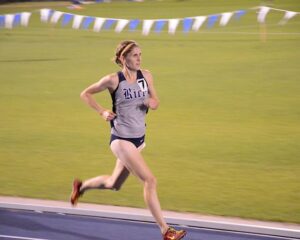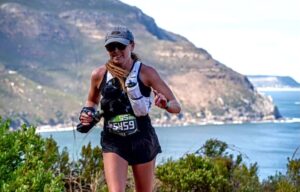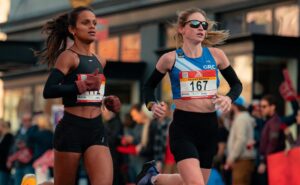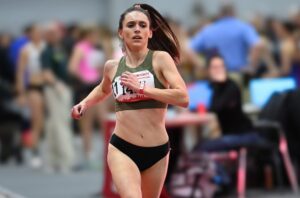
Liza Corso had her first taste of international competition the summer after she graduated from high school. She went into the T13 1500m final at the 2021 Paralympic Games in Tokyo ranked eighth, not expecting to be in medal contention. But Corso had the race of her life, shaving 13 seconds off her personal best and earning a silver medal in 4:30.67.
Now a junior at Lipscomb University, Corso, 20, has continued to make big performance leaps. Last spring, she ran 2:07.83 for 800m, 4:19.54 in the 1500m, and 16:22.95 in the 5,000m. And in the fall, she helped Lipscomb earn a surprise 11th-place finish at the NCAA Cross Country Championships, after the team went in ranked 25th. Corso finished 138th, running 20:56 for 6K, and was Lipscomb’s sixth runner.
Corso has had an impressive collegiate career so far, but it’s all the more so when you consider that she was born with oculocutaneous albinism (OCA), which makes her legally blind and affects her depth perception. She has low pigment in her hair, skin, and eyes, which causes her to be very sensitive to the sun. She races wearing a hat, trains wearing sunglasses, and makes sure to wear sunscreen.
In the T13 division at Para competitions, Corso races other athletes with visual impairments. In August, she earned another silver medal in the T13 1500m, at the world championships in Paris. This summer, she hopes to make a return trip to the Paralympics, which are also in Paris.
Growing up in Newmarket, New Hampshire, Corso wasn’t aware of the Paralympics until her sophomore year of high school at Portsmouth Christian Academy. She doesn’t normally race with a guide, but that year, her cross country league championship had moved to a new location. She expected to be up front and was worried about getting lost, because she didn’t know the course. So her coach, Mike Shevenell, recruited two older male runners to serve in the same role as a lead vehicle would.
She won the race, and it made the local news. Someone who worked for the U.S. Association of Blind Athletes saw it and reached out and told her about the Paralympics and invited her to a camp. At first, she was hesitant.
“Running was a place where my vision affected me, but I could kind of hide it and just run like everyone else,” Corso told Fast Women. “Doing the Paralympics, it was something where my vision was now in the spotlight.”
Sports were a part of Corso’s childhood. She swam, skied, played basketball, and even did gymnastics. “My parents definitely didn’t hold me back based on my vision,” she said. “They were like, ‘You want to try this? Go for it.’ Looking back, oh my gosh, I don’t have depth perception. How did I walk on a balance beam or run into a vault? But it was just the mindset of just try it, just go for it.”
The activity she was most focused on during middle school, though, was competitive jump rope. She and her teammates would compete and perform around the country. She credits speed jump rope, where competitors did as many jumps as possible during a set amount of time, for building the speed and endurance she needed to be a good runner. Corso ran her first 5K at age five and joined her elementary school’s cross country team in fourth grade. But she didn’t start to get more serious about running until she got to high school.
Lipscomb coach Nick Polk started coaching Corso leading into the 2021 Paralympic Games, and she thinks the gradual mileage increase and tougher and more targeted workouts contributed to her breakthrough and silver medal. Her momentum slowed slightly during her first year of college, when she developed a stress reaction in her shin during the indoor season, but since healing, she has been on an upward trajectory.
Corso also credits her teammates and Lipscomb’s positive team culture. “We’re able to work really hard in practice and in races, but we’re doing it for each other, and we’re really supportive of each other, instead of getting competitive that way,” she said. “And I think all having the same goal of glorifying God through racing and training has been really cool, too.”
Corso is double majoring in psychology and nutrition and minoring in exercise science. It’s helpful when her professors post their powerpoints or tests online, so she can zoom in on her screen. She takes notes on an iPad, using an Apple pencil, because sometimes it’s hard for her to see her own handwriting. If she’s in a restaurant and can’t see a menu, or if she’s unable to read a sign, she will take a photo with her phone and zoom in on it. “I use tools that many people have access to,” she said. “I just use them in a different way.”
Her teammates are always happy to help her out, giving her rides to practice because she can’t drive, or reading off splits during workouts. Corso can read about size 20 font, so she can read the numbers on her watch, but it’s more challenging when the sun’s out and there’s a glare.
Cross country races with crowded fields can be challenging, too. But Corso points out that staying on one’s feet can be tough for everyone. She found the steep downhills at NCAAs, hosted by the University of Virginia, to be particularly tough because of her lack of depth perception.
When she runs track races with a waterfall start, Corso sometimes has trouble seeing the break line or the cone that marks where the athletes on the outside need to cut in. So when possible, she’ll have a coach stand at that spot and give her the vocal cue.
She has gradually worked her way up to 60–65 miles per week, compared to the 25–35 she ran during high school. This year, keeping the Paralympics in mind, which will take place at the end of August, she and Polk will be more cautious about not overdoing her training and racing early in the NCAA season.
The Paralympic Track & Field Trials will take place July 18–21 in Chula Vista, California. In order to make the team, Corso will have to place well in the 1500m and run a fast time. If she continues to run the way she’s been running, it shouldn’t be a problem. At last summer’s world championships, she finished only 0.35 seconds behind the winner, Fatima Ezzahra El Idrissi of Morocco. Assuming Corso earns a return trip to Paris, she’s hoping for gold this time out.
Corso used to try to hide her visual impairment, but participating in the Paralympics and hearing other athletes’ incredible stories emboldened Corso to share hers. She wants to show other people with disabilities or visual impairment that it’s not something to hide; it’s just a part of them. Her advice? “Don’t let anyone hold you back from accomplishing what you want to accomplish,” she said. “Everyone has challenges in their life—some may be seen, some may be unseen—but we are all able to work through them.”






